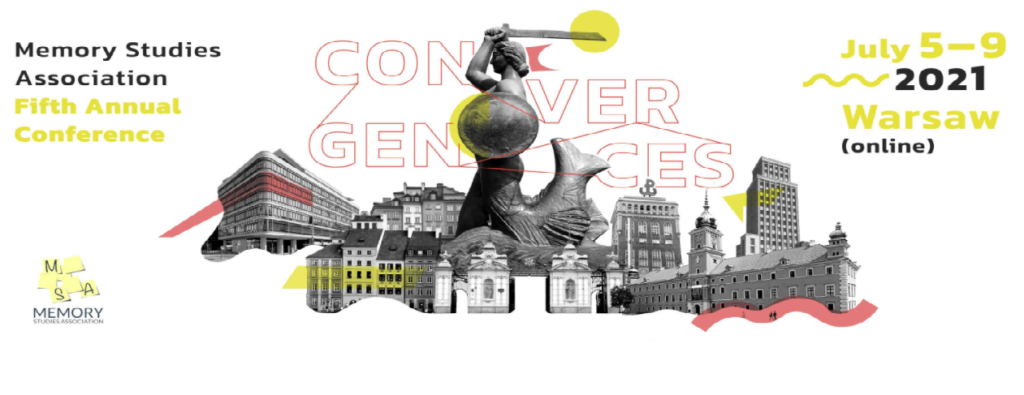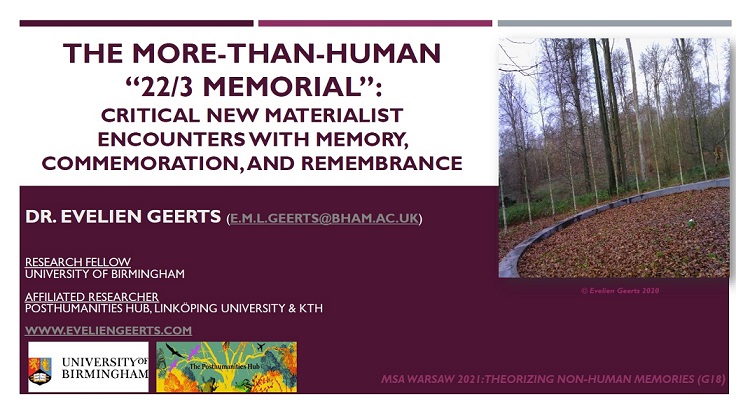The Memory Studies Association’s 5th Annual Conference was held digitally in Warsaw, Poland, this year, and that during the 5th and 9th of July 2021.

Titled “Convergences”, this year’s pandemic edition explored various subsets of thought and innovative explorations within the field of memory studies, and that with an extra focus on the academic and real-life potential of the interdisciplinary entanglements between memory studies and fields as diverse as posthumanist and new materialist philosophies; environmental studies; history; and the digital humanities.
In addition to various panels exploring “Practical/Ethical COVID-19 Convergences” that addressed how the COVID-19 pandemic has forced us to rethink practicing memory studies as such; “Historical Convergences” spotlighting memory studies and the past and present socio-political situation in East and Central Europe; “Political Discursive Convergences” touching upon the need to update memory politics; “Institutional Convergences” reflecting upon institutionalized types and forms of public memory; “Biological/Ecological Convergences” highlighting questions of extractive capitalism and the Anthropocene; and, last but not least, “Disciplinary Convergences” spotlighting memory studies’ need to engage in inter- and transdisciplinary dialogues, the conference truly offered something to anyone with an interest in the discipline.
One of the conference’s highlights, for me personally, was the keynote given by Professor of History of Slavery and Memory of Enslavement Olivette Otele (University of Bristol, UK). Otele’s digital talk, “Memory of Colonial Enslavement: Convergent Activism in 21st Century Britain”, injected the discipline of memory studies with much-needed doses of critical race studies and postcolonial historical thought, while reflecting upon the epistemological and real-life violence the erasure of colonial history by Europen nation states has caused. I found Otele’s notions of ‘mis-‘ and ‘dis-‘remembering of colonial history and what she labeled ‘minority histories’ in particular crucial for anyone interested in critical epistemologies and rerooting memory studies as a contemporary discipline.
There were also lots of interesting pre-events and cultural events to explore: I, for instance, also attended a virtual tour of the Warsaw Uprising Museum; a museum that was constructed to honor the Warsaw residents that fought for an independent Poland. This specific tour made me further reflect upon the idea of so-called ‘contested histories’ or the fact that official narratives about historical events often get twisted, politically reappropriated or even blatantly disregarded – which is definitely something to keep an eye out for in these post-truth pandemic times.
In a sense, memory studies always must tackle that what is remembered, and that what, through processes and artefacts of remembrance and commemoration, is not remembered. Or, put differently: not regarded worthy of remembrance and commemoration…

This double (non-)remembering dynamics brings me to the panel I was part of, namely, “Theorizing Non-Human Memories”.
Amidst a group of speakers that focused on posthumanist, new materialist, Deleuzoguattarian and affect theoretical approaches vis-à-vis memory studies, I presented my paper on “The More-Than-Human ’22/3 Memorial: Critical New Materialist Encounters with Memory, Commemoration, and Remembrance”. Part of the Urban Terrorism project that engages with various haunting materializations – and also not acknowledged materializations – of political, terrorist violence in Europe, this presentation tackled the specific theoretical-methodological questions that arise when trying to theorize affect-filled encounters with more-than-human memorials, such as the Sonian Forest-located 22/3 Memorial remembering the 2016 Brussels attacks, while trying to create a transdisciplinary dialogue between memory, trauma, and new materialist and posthumanist studies.
As the UrbTerr team will be organizing a memory studies-themed conference in 2022 as well, the MSA 2021 definitely provided us with much-needed critical food for thought!
